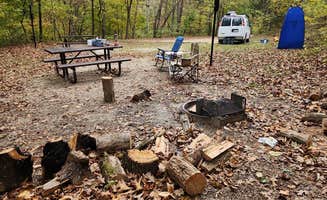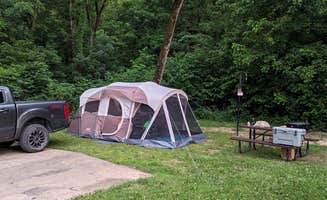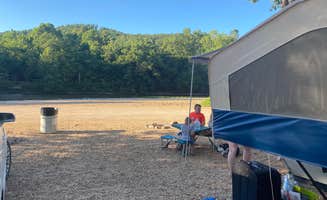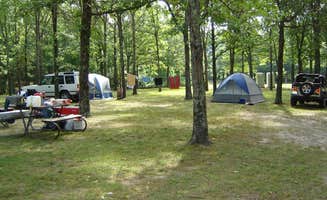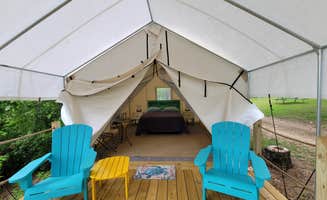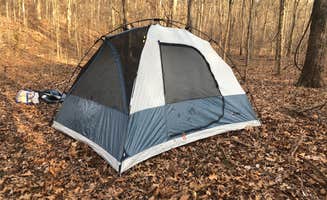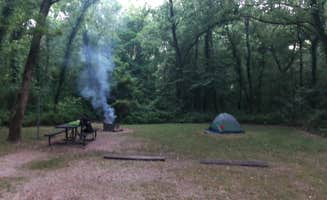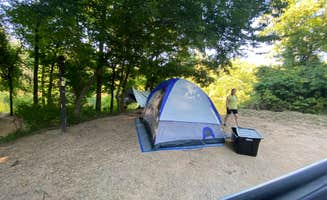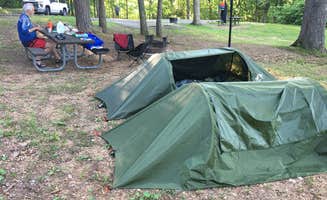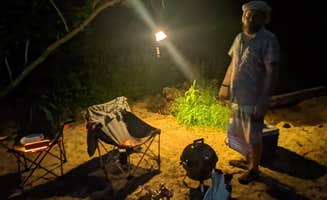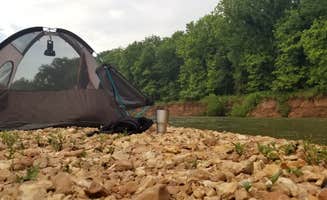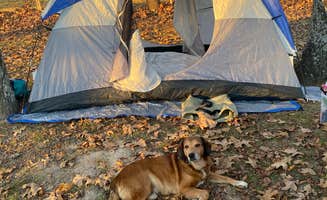Dispersed camping options near Mountain View, Missouri center around creek-fed waterways and limestone terrain. Blue Spring Backcountry Camping provides primitive sites directly in Mountain View at 37.05° latitude, where campers access clear, cold water with temperatures remaining consistently below 60°F year-round. Road access becomes significantly more challenging after rainfall, with several low-water crossings throughout the area requiring high-clearance vehicles.
What to do
Spring exploration: Blue Spring Backcountry Camping in Mountain View features a deep blue spring that draws visitors. One camper noted, "What an awesome place to see very cold water, camp sites are a little Ricky but manageable, does get to be a very busy spot in the summer." Accessible via short trails from camping areas, the spring maintains a consistent temperature year-round.
Cave tours: Round Spring Campground offers cave exploration from June through October for $5 per person. "Tours of the cave are given daily June through August and cost $5. The lantern tours show an amazing cave with many beautiful formations," reports a visitor. Tours last approximately 1 hour and require moderate physical ability to navigate uneven terrain.
Mill tours: The historic mill at Alley Spring Campground provides educational opportunities. "Checked out the camping facilities at every spring that offered camping. The grounds were well kept and all the folks working their we're courteous, knowledgeable, and helpful. Very short drive to get to the spring & mill," writes one camper who visited multiple springs in the region.
Wildlife viewing: Early mornings offer opportunities to see river otters, bald eagles and even wild horses at several camping areas. "We saw a bald eagle and a very curious little otter down by the river. Close proximity to the ozark trail," reports a Round Spring visitor who camped during April.
What campers like
Privacy levels: The spaciousness of sites varies significantly between campgrounds. At Pulltite Campground, "The closer you stay toward the camp hosts and the store, the more crowded the sites are. But if you get down the road farther, the camp sites space out a bit more and offer some privacy." Some sites feature immediate river access while others require short walks to water.
River swimming: Multiple swimming areas with varying depths accommodate different skill levels. "Great swim area. Shower house is basic. We stayed in our RV on a spot with river view," notes a reviewer at Circle B Campground. Water levels fluctuate seasonally, with late summer offering shallower, warmer conditions ideal for families with children.
Evening programs: Several campgrounds feature ranger-led educational activities. "The host was great did a nice show at the amphitheater about the local area bathroom and showers are great, not to mention the nice clean river," writes a Round Spring visitor. These free programs typically run Thursday through Saturday evenings during peak season.
Fishing opportunities: Trout fishing draws many visitors to Montauk State Park where stocking happens daily. "This is a great area to fish for trout. The river is beautiful and offers a place to relax. The campground offers several different options depending on your set up," reports a visitor. Daily trout tags cost $3 and allow keeping up to 4 fish per day.
What you should know
Reservation requirements: Peak season demands advance planning. "MAKE RESERVATIONS! This campground exploded in the last few years and it's always packed when we go anymore is the only downside," advises a Pulltite visitor. Most National Park Service campgrounds accept reservations 6 months in advance.
Seasonal closures: Operating seasons vary widely across the region. Montauk State Park remains open year-round, but most National Park Service campgrounds close from mid-October through mid-April, including Round Spring, Alley Spring, and Pulltite Campground.
Weather impacts: Flooding occurs regularly in spring. "The campground is located on the flood plane, heavy rain may cause flooding and evacuation!" warns a camper about Alley Spring. Low-lying sites near rivers face the highest risk, while elevated campgrounds like Echo Bluff State Park typically remain accessible.
Supply considerations: Services are limited near camping spots. As one camper at Rymers Backcountry Camping notes, "Long beautiful drive in, narrow road would not reccomend for motorhome over 20' or any large camper as there is no backing up or turn arounds." Most campers recommend bringing all supplies before arriving, as the nearest full grocery stores are 30+ minutes away.
Tips for camping with families
Tent selection: For families with young children, campgrounds with flush toilets provide easier overnight experiences. "Tranquil, peaceful, quiet. I could stay at Alley forever. Beautiful spot," writes one camper at Alley Spring Campground, which provides restroom facilities throughout the camping area.
Educational opportunities: Mill tours and nature programs engage children with local history. "There are Ranger-led campfire programs in the summer months," notes a visitor about Pulltite Campground. These programs run Thursday through Sunday evenings and cover topics like wildlife, geology, and cultural history.
Safety considerations: Clear boundaries help protect children from river hazards. "The Current River was accessible but not so close to be dangerous for our little one," reports a family visitor. Designated swimming areas provide safer alternatives to river access points with unpredictable currents.
Noise factors: Campground sound levels vary significantly by location and day. "Very nice campground, tons of shade! My site was very level and was surrounded in trees like basically ever other site which made it comfortable to sit outside all day," notes a Montauk State Park visitor, highlighting how tree cover can buffer noise between sites.
Tips from RVers
Electrical access: Power availability varies widely between campgrounds. "We stayed in a campsite on the river. The campsites are a little close together but no one was at the one next to us so it did not feel so bad," reports a Circle B Campground visitor. Most riverside sites with electrical hookups require reservations well in advance during summer months.
Road conditions: Access roads challenge larger rigs at several campgrounds. "Paved throughout. Plenty of clean restrooms and showers," notes a Pulltite visitor about internal roads, though access roads remain challenging. Most campgrounds recommend maximum lengths under 32 feet for trailers and motorhomes.
Level sites: Site levelness impacts comfort in hard-sided units. "Very nice campground, tons of shade! My site was very level and was surrounded in trees like basically ever other site," reports a Montauk State Park visitor. Sites along the riverside often require more leveling blocks than interior locations.
Dump station access: Sanitation facilities exist at main campgrounds but not backcountry areas. "There is a dump station" reports a Round Spring visitor, noting this essential RV service. Most dump stations close seasonally alongside campground operations, typically mid-October through mid-April.


